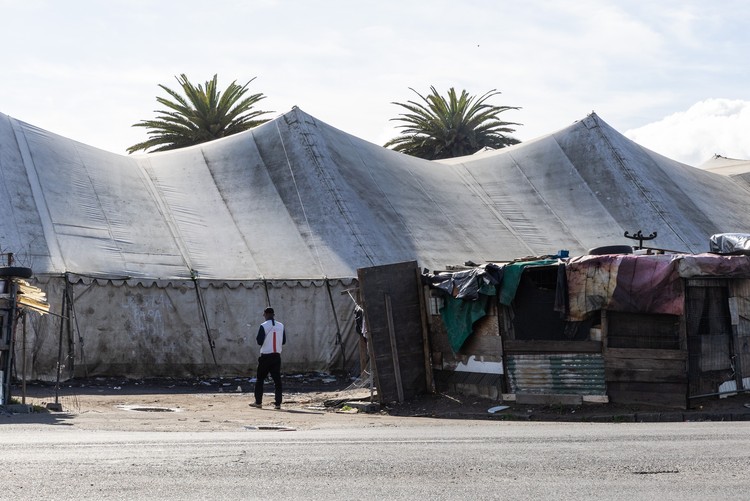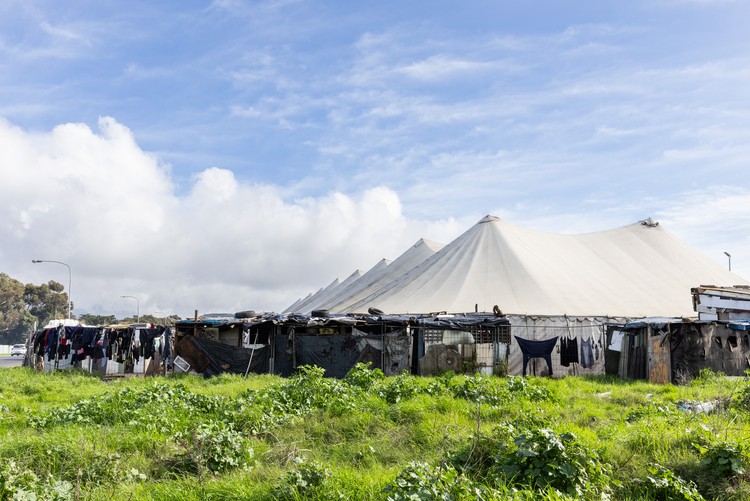City of Cape Town to evict refugees living at two emergency housing sites
About 160 refugees at Wingfield were among those who protested outside the office of the UN High Commissioner for Refugees in 2019
About 160 refugees are living in a large white tent on government land at Wingfield in Maitland. They have vowed to fight any attempt to evict them. Photos: Ashraf Hendricks
- The City of Cape Town, with the ministers of Home Affairs and Public Works, has applied to the Western Cape High Court to evict refugees from emergency housing sites in Maitland and Bellville.
- The group were among hundreds of refugees who had protested outside the United Nations High Commissioner for Refugees (UNHCR) offices in Cape Town in October 2019.
- Some are demanding to be resettled in Europe and Canada and others want the government to help them get documents.
- The group living at the Wingfield site have vowed to fight the eviction.
Refugees living in a large white tent on government land at Wingfield in Maitland have vowed to fight any attempt to evict them. This comes after the City of Cape Town filed a joint eviction application with the ministers of Home Affairs and Public Works in the Western Cape High Court.
The group were among the hundreds of refugees who protested outside the United Nations High Commissioner for Refugees (UNHCR) offices in Cape Town in October 2019, demanding to be resettled in countries other than South Africa.
Many of the protesters eventually returned to local communities, but some families held out for their demands. They were relocated under Covid level 5 lockdown emergency regulations to camps in Wingfield and Paint City in Bellville. Despite conditions at the sites, most refused to return to local communities.
There are still about 160 refugees living at the site. There are portable toilets and communal taps. Some people have built makeshift structures around the tent on land owned by the Department of Public Works.
Faraja Augustin, who fled the Democratic Republic of Congo as a young man and eventually reached South Africa, said he had remained at Wingfield because he feared xenophobic attacks if he returned to Dunoon. He is still traumatised by a spate of xenophobic attacks in 2008 when he was running a barbershop and living there.
“If you sell something [fruit and veg] on the street, the community will come and ask for your papers. If you don’t have papers, they will harass you, beat you up and take your stuff.”
“We need solutions. I won’t be able to go home to my country, I’ll be persecuted,” he said.
People living inside and around the tent have refused offers of government assistance to reintegrate them with local communities.
City spokesperson Luthando Tyhalibongo said they are hoping to get a court date soon.
“Hundreds of foreign nationals have accepted reintegration back into their local communities … and to date, the fears of widespread xenophobic violence, cited in the original occupation demands, have not materialised,” he said.
Tyhalibongo said various government entities had offered “forms of assistance over time” to the refugees, including help with their refugee status. He said when officials visit, they face hostility.
Jan De Bisschop, external relations officer at the UNHCR in Pretoria, said they were aware of the eviction process in Cape Town. “While our concern remains with the welfare of the people, we also emphasise that the refugees and asylum-seekers must comply with the laws of South Africa.”
“South Africa is currently hosting more than a quarter of a million refugees and asylum-seekers, and is standing by its international and national legal refugee obligations,” he said.
He said UNHCR encourages the remaining occupants to return to their local communities, enrol their children in school and restart their lives.
“We have established a designated help desk where refugees receive confidential advice and counselling on voluntary return [to their home countries],” he said.
Minister of Home Affairs Leon Schreiber said hundreds of people had taken up opportunities to be assisted with reintegration.
“The demands of remaining unlawful occupants for relocation to Europe or Canada can never lawfully be met, nor can the state continue to bear expenses related to these sites. These facilities were never intended to provide permanent accommodation, but rather to provide temporary shelter during the Covid pandemic,” he said in a statement.
Support independent journalism
Donate using Payfast

Don't miss out on the latest news
We respect your privacy, and promise we won't spam you.
Next: Judge Mbenenge inquiry: “It’s a campaign to shame me”
Previous: Gauteng government scrambles to meet drug rehab targets
© 2025 GroundUp. This article is licensed under a Creative Commons Attribution-NoDerivatives 4.0 International License.
You may republish this article, so long as you credit the authors and GroundUp, and do not change the text. Please include a link back to the original article.
We put an invisible pixel in the article so that we can count traffic to republishers. All analytics tools are solely on our servers. We do not give our logs to any third party. Logs are deleted after two weeks. We do not use any IP address identifying information except to count regional traffic. We are solely interested in counting hits, not tracking users. If you republish, please do not delete the invisible pixel.


